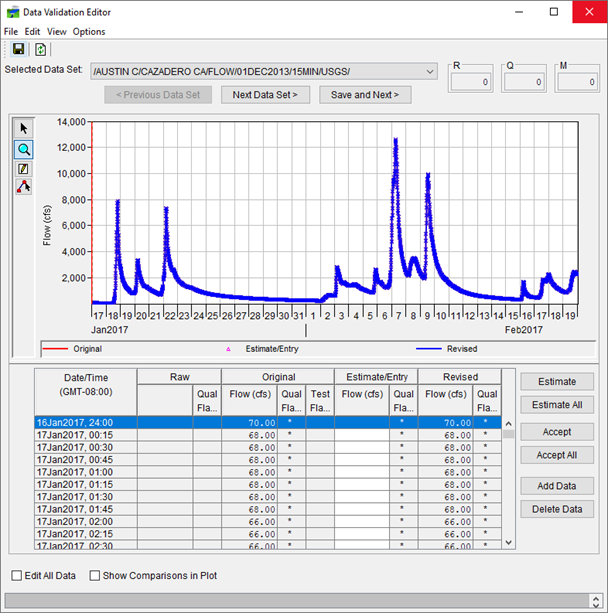Graphical Editing Area
The graphical editing area (Figure 1) displays the selected dataset graphically. By default, a blue line represents data values that have been validated, and a green line represents the original data values in DSS file(s).
By default, the data shown in the plot, scales so that all data values are visible in the plot, this is because the data could contain erroneously large or small data values. From the Options menu (Data Validation Editor), if the user turns off the Scale Plot to Raw Data flag, the plot window will scale to the validated data, potentially leaving any original data beyond the validated value bounds outside of the plot window.

The data that is visible in the tabular data area is highlighted as a green-hatched column in the graphical editing area (Figure 1). A vertical black line (Figure 1) in the graphical editing area, or running through the green-hatched column in the graphical edit area, indicates the specific record in the tabular data area you have selected.
Graphical Editing Tools
The Graphical Editing Tools on the Data Validation Editor allow viewing and editing of data in the graphical editing area. The available tools are: ![]() Pointer/Selector Tool
Pointer/Selector Tool
The Pointer/Selector Tool allows the user to navigate in the graphical editing area and move quickly through a large dataset. Select one data point then hold the shift key and select another point in the graphical editing area to select a range of data points.
![]() Zoom Tool
Zoom Tool
The Zoom Tool allows the user to magnify specific sections in the graphical editing area. To use the Zoom Tool, click and drag a rectangle around the area to be magnified. If the user needs to zoom out, right-clicking repeatedly will progressively reverse the zoom magnification.
![]() Single Point Edit Tool
Single Point Edit Tool
The Single Point Edit Tool allows the user to select an individual or a range of data points ![]() , execute estimates
, execute estimates ![]() , and to set quality flags in the graphical editing area.
, and to set quality flags in the graphical editing area.
![]() Multi-Point Edit Tool
Multi-Point Edit Tool
With the Multi-Point Edit Tool, the user can edit data by drawing new plot lines in the graphical editing area.
Shortcut Menus
The user can customize the appearance of the graphical editing area by using several properties editors (Figure 2). These properties editors are accessed by right-clicking on the different elements of the plot, and from the shortcut menu, clicking Edit Properties. The available shortcut menus and properties editors are listed below:

| Polygon Properties | This editor (Figure 2) will allow you to customize borders and backgrounds of the green-hatched column in the graphical edit area (G2dPolygon shortcut menu) of the Data Validation Editor. |
| Viewport Properties | This editor (Figure 2) will allow you to customize the border, background, and gridlines of the graphical edit area, and also add markers (Viewport shortcut menu) to the Data Validation Editor. |
| Axis Properties | This editor (Figure 2) will allow you to customize the axis scale, tic marks, and axis type (Axis Tics shortcut menu) of the Data Validation Editor. Also, if you click on an axis title, from this editor (Figure 2), you will be able to view the axis label, change the font, alignment of the axis title, add a border, and add color (Axis Label shortcut menu) to the Data Validation Editor. |
| Legend Properties | This editor (Figure 2) will allow you to move the legend to the right of the plot or to the bottom of the plot, or hide the legend (Legend Panel shortcut menu) of the Data Validation Editor. |
| Curve Properties | This editor (Figure 2) will allow you to edit various properties of the displayed curves in the Data Validation Editor. You can display, remove, change the color, add label, show in legend, and many other properties that can be manipulated (Curve Name shortcut menu). |
| Specific Record Properties | This editor (Figure 2) will allow you to customize the vertical red line (Figure 2) that indicates the specific record in the tabular data area of the Data Validation Editor that you have selected (ScrollView Data shortcut menu). |